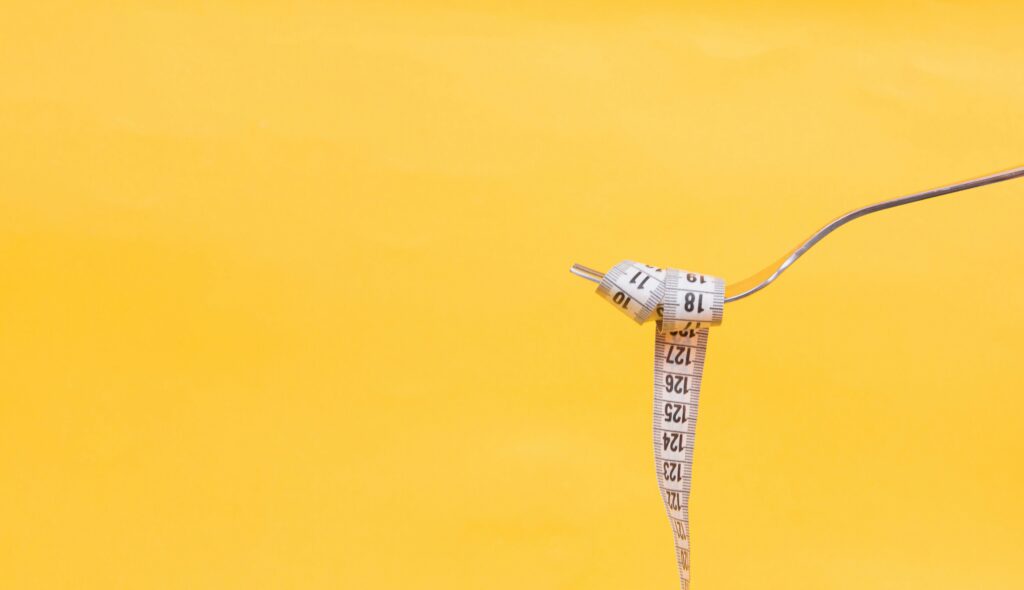Few things in health and fitness feel more frustrating than when you’re not losing weight, even with a calorie deficit.
Let’s face it—weight loss involves a lot of sacrifices and hard work! If you’re going to pass on sweets, fries, and other goodies, you want to see the scale MOVE (like yesterday).
In this post, I’ll share some common reasons why you’re not losing weight even with a calorie deficit so you can break out of that plateau and finally get the desired results.
It Hasn’t Been Long Enough
It’d be amazing if the pounds melted off after eating healthy for a few days. As I’m sure you’ve guessed (if you’re reading this article), that’s not how it works.
Fat loss requires creating a consistent calorie deficit, day in and day out.
For each pound you want to lose, you’ll need to consume around 3500 fewer calories than you burn (although that number has been widely debated and likely varies from person to person).
For most people, doing it safely will take at least a week or two. And FYI, drastic measures meant to speed up the process only increases the likelihood you’ll regain the weight.
Stay the course if you’ve only been at this for a few days. Give it at least two weeks before you decide your diet isn’t working.
You’re Not Actually in a Calorie Deficit
Before I continue, I need to ask a favor: Please don’t hate me.
Certain medical conditions may decrease energy expenditure a bit.
But in my experience as a registered dietitian, 99 percent of people who tell me they’re not losing weight even with a calorie deficit…aren’t in a deficit.
They’re either overestimating calorie expenditure, underestimating how much they eat, or both. Let’s break this down, point by point:
You’re Burning Fewer Calories Than You Think
Are you using online calculators to estimate your calorie needs? What about wearables, like an Apple Watch or a Fitbit?
You might be burning fewer calories than you think.
Wearable technology is great for tracking things like how many steps you take. But calorie burn? Not so much.
Researchers in a 2017 study used medical technology to compare the accuracy of seven different fitness devices (the Apple Watch, Basis Peak, Fitbit Surge, Microsoft Band, Mio Alpha 2, PulseOn, and Samsung Gear S2).
None of the devices fell “within an acceptable error range” (in other words, they were waaaaaay off).
In fact, the “best” device overshot by about 27 percent, while the worst was off by a whopping 93 percent.
Hopefully, you can see how this might be problematic if you rely on your fitness tracker to tell you how many calories you need for weight loss.
You’re Eating More Calories than You Realize
Using a fitness device to estimate your calorie burn could be one reason you’re not losing weight even with a calorie deficit.
But another common reason you’re not losing weight is that you eat more calories than you realize.
And look, there’s no judgment here. Lots of people do it, including dietitians, often by several hundred calories! It’s so easy to underestimate, especially if you:
- Graze throughout the day, taking bites, licks, tastes, and sips.
- Eat while distracted, making it difficult to remember everything you ate.
- Dine out frequently.
- Eyeball your portion sizes.
- Feel shame or embarrassment around your eating habits.
And as I’m sure you can appreciate, overestimating your calorie burn while also underestimating how many calories you eat is an especially dangerous combo.
But don’t get discouraged–there’s a fairly straightforward solution.
What to Do If You’re Not Losing Weight Even with a Calorie Deficit
The best way to break out of your weight loss plateau is to keep a candid record of every morsel and sip you put in your mouth.
I’m talking, so honest you could testify in a court of law about your eating habits.
You’ll get the best data if you weigh everything on a food scale, but you can also use your hands to estimate your portion sizes if weighing isn’t right for you.
Eat how you normally would, keeping careful records for at least two weeks.
Once you’ve hit the two-week mark, weigh yourself again. If you haven’t lost weight, reduce your calorie intake by 10 percent (or remove a serving of either carbs or fats using the hand method).
Repeat this process, making adjustments every two weeks until you see progress.
The results might not come as quickly as you’d like. However, this gradual and analytical approach is often more sustainable over time.
The Bottom Line
Weight loss can be a frustrating process, especially when you feel like you’re not losing weight even in a calorie deficit.
Assuming you’ve seen the doctor to rule out any medical issues, there’s some possibility that you’re not actually in a calorie deficit.
It’s not just you–this is a super common phenomenon!
Hopefully, changes in how you track calories will put you on the path to weight loss. If you get stuck, I’d love to help! Click here to learn more about working with me one-on-one.

